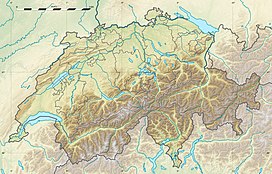Bernina Pass
| Bernina Pass | |
|---|---|
 View from the top of the pass in the direction of Pontresina, Switzerland | |
| Elevation | 2,328 m (7,638 ft) |
| Traversed by | Road, rail (2253 m.) |
| Location | Graubünden, Switzerland |
| Range | Alps |
The Bernina Pass (el. 2328 m.) (Italian: Passo del Bernina) is a high mountain pass in the Bernina Range of the Alps, in the canton of Graubünden (Grisons) in eastern Switzerland. It connects the famous resort town of St. Moritz in the Engadin valley with the Italian-speaking Val Poschiavo, which ends in the Italian town of Tirano in Valtellina. The pass lies a few kilometres east of Piz Bernina. A lower pass is located west of the Bernina Pass, at 2,253 metres.
The Bernina Pass is crossed by road and rail, with a popular tourist train, the Bernina Express operating year-round between Chur and Tirano. The train crosses the lowest pass at 2,253 metres (at Ospizio Bernina) - it is the highest adhesion railway route in Europe.
Lago Bianco, Lej Nair and Lej Pitschen are located on the pass.

Climate
| Climate data for Passo del Bernina (1981-2010) | |||||||||||||
|---|---|---|---|---|---|---|---|---|---|---|---|---|---|
| Month | Jan | Feb | Mar | Apr | May | Jun | Jul | Aug | Sep | Oct | Nov | Dec | Year |
| Mean daily maximum °C (°F) | −3.7 (25.3) |
−3.7 (25.3) |
−1.4 (29.5) |
1.5 (34.7) |
7.0 (44.6) |
11.1 (52.0) |
14.0 (57.2) |
13.4 (56.1) |
9.4 (48.9) |
5.5 (41.9) |
−0.2 (31.6) |
−3.0 (26.6) |
4.2 (39.6) |
| Daily mean °C (°F) | −7.2 (19.0) |
−7.5 (18.5) |
−5.3 (22.5) |
−2.4 (27.7) |
2.7 (36.9) |
6.4 (43.5) |
9.2 (48.6) |
8.9 (48.0) |
5.2 (41.4) |
1.7 (35.1) |
−3.5 (25.7) |
−6.3 (20.7) |
0.2 (32.4) |
| Mean daily minimum °C (°F) | −10.8 (12.6) |
−11.2 (11.8) |
−8.8 (16.2) |
−5.5 (22.1) |
−0.6 (30.9) |
2.8 (37.0) |
5.6 (42.1) |
5.4 (41.7) |
2.4 (36.3) |
−1.0 (30.2) |
−6.3 (20.7) |
−9.6 (14.7) |
−3.1 (26.4) |
| Average precipitation mm (inches) | 109 (4.3) |
83 (3.3) |
110 (4.3) |
165 (6.5) |
175 (6.9) |
160 (6.3) |
146 (5.7) |
149 (5.9) |
152 (6.0) |
178 (7.0) |
187 (7.4) |
125 (4.9) |
1,738 (68.4) |
| Average snowfall cm (inches) | 107.4 (42.3) |
86 (34) |
105.4 (41.5) |
146.1 (57.5) |
49.1 (19.3) |
9.6 (3.8) |
2.1 (0.8) |
2.1 (0.8) |
9.7 (3.8) |
46.3 (18.2) |
114 (45) |
113.9 (44.8) |
791.7 (311.7) |
| Average precipitation days (≥ 1.0 mm) | 7.6 | 6.9 | 7.9 | 10.6 | 13.1 | 11.5 | 11.4 | 12.0 | 9.3 | 10.5 | 9.5 | 8.5 | 118.8 |
| Average snowy days (≥ 1.0 cm) | 8 | 7.9 | 8.9 | 11 | 5.3 | 1.6 | 0.3 | 0.4 | 1.8 | 5.2 | 9.2 | 8.5 | 68.1 |
| Average relative humidity (%) | 63 | 65 | 67 | 72 | 72 | 69 | 67 | 70 | 71 | 70 | 68 | 66 | 68 |
| Source: MeteoSwiss [1] | |||||||||||||
See also
References
- ^ "Climate Norm Value Tables". Climate diagrams and normals from Swiss measuring stations. Federal Office of Meteorology and Climatology (MeteoSwiss). Retrieved 23 January 2013. The weather station elevation is 2307 meters above sea level.
External links
- Swisstopo maps
- Pictures from the Bernina Pass Mountainbike Route
- Profile on climbbybike.com
- Bernina Pass in Romansh, German, French and Italian in the online Historical Dictionary of Switzerland.
 Media related to Berninapass at Wikimedia Commons
Media related to Berninapass at Wikimedia Commons

